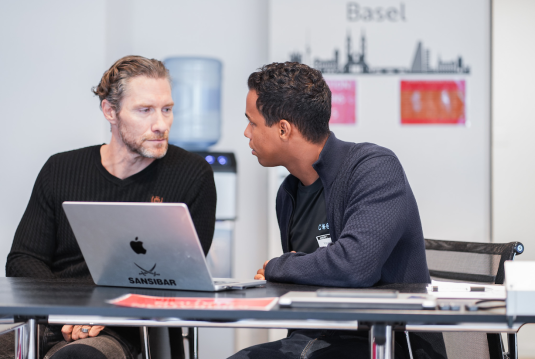Coopers Life Sciences – Interview with Saad Bendadi, Bussiness Manager Life Sciences
Today we get to share some insights from our Business Manager Life Sciences – Saad Bendadi. Saad has been a part of the Coopers family for 2,5 years and works in our Nyon office. He is our expert in life sciences recruting and we talked over the phone to discuss current and future topics of the industry.
Saad, you have both, an educational tech background as well as medtech industry experience. Tell us, how did you find your way into recruiting?
That is right, my background is a great asset to understand today's talent market and to support our business partners in the best way possible. I have a real passion for both science innovation and people development.
Certainly, industry knowledge is a prerequisite for understanding market changes and anticipating needs. But 'PEOPLE' remains at the heart of my job. Helping people shine their brightest, shaping their career while creating business value for companies is a such rewarding experience! And serving fields that lead the search of tomorrow's cures, in this particular time, remains a privilege.
What do you like best about working in recruitment now?
Our industry is currently experiencing a rapid fusion of digital tech tools and marketing strategies which leads to the rising hybrid discipline called recruitment marketing. It's about delivering the right message to the right talents at the right time. I have always cultivated this trend and educated my team respectively as I see a fantastic opportunity in this for us to innovate and go beyond traditional recruitment practices.
Life sciences and especially the pharmaceutical industry are in the spotlight during the Corona pandemic. Can you tell us, how you experienced this past year?
It was a crazy year, for sure! 2020 has certainly not been the year that any of us expected!
This pandemic is a reminder how dependent we are on each other, how much we need people in our lives. Social distancing, enforced lockdowns, virtual meetings, events and restricted travel – it challenged us all. The biopharma industry had to adapt and be creative, too. But responding well now with the right mindset is key to build a collective resilience, industry wide.
And yes, it is absolutely true, medtech as well as biopharma have found themselves in the spotlight during this critical time. Globally, the sector is collectively working on developing vaccines, treatments and they are ramping up the production of new diagnostic tests and devices. They have a unique chance to reinforce their purpose and remind everyone their goals extend far beyond just selling product and generating profits.
I agree. Saad, you are a local life sciences expert. How is the Swiss life sciences industry positioned amidst the Corona pandemic?
Swiss biopharma companies are very well positioned to play a leading role in the response to the corona pandemic, large scale corporations just as much as start-ups. We're proud to support this dynamic with very promising up-coming projects.
We talked about changes triggered by the pandemic in the life sciences industry. With all the limitations of personal interactions, the recruiting changed dramatically, too. How did you and your team cope with that?
Absolutely, everything changed from one day to the other. The talent acquisition practice has been challenged due to the limited personal contact – for us in recruiting and for companies alike. Many organisations are facing the reality of hiring and onboarding new candidates in a remote-only environment. Video interviews and advanced recruitment tools help to facilitate meetings and streamline business decision, but nothing can replace the human element. Relationship-driven recruitment that is focused on human interaction and trust creates a unique candidate experience. Latter is a crucial strategy to attract and retain talent. In my team, and at Coopers generally, the candidate experience is of utter importance. We stay in touch as much as possible with our candidates and clients, we follow up frequently and offer our support at any time.
Let's jump a bit forward in time to talk about life after Corona. As a recruiter, you need to be up to date with trending topics in your respective industry. Just recently we have discussed IT trends on the Coopers blog, like, artificial intelligence. Surely, this plays a critical role in medtech, as well. What is your take on this?
Over the years, Switzerland has become a leading hub for artificial intelligence (AI), establishing itself as one of the most innovative countries in the world. We've witnessed a rapid increase of digitalization in today's healthcare sector, which might become the new 'normal' in medicine.
There are numerous ways in which AI is transforming the medtech industry, which explains why the global software revenue from its top cases in healthcare is predicted to grow from 3.7 billion USD in 2019 to nearly 67 billion USD by 2027. This technology can improve precision, speed, and efficiency of diagnoses.
Start-Ups are already jumping at the opportunity to create innovations, especially with the digital needs of the post-pandemic world in mind. I can see multiple types of AI applications in healthcare, which includes robotics, monitoring, virtual health assistance (e.g. chatbots in patient self-diagnosis), training (e.g. AR/VR and MR tech) and wearables (e.g. growing adoption of Internet of Medical Things).
However, medical diagnostics in particular may have the most potential for AI technology as long as governing and regulatory bodies can determine how to regulate the use of algorithms in that space.
Which life sciences trends and innovations do you see in the near future? And in the long run, what are you most excited about to see?
Life sciences companies learned a lot during the pandemic. It also boosted consumer adoption of many innovative technologies and highlighted the importance of 'agility'.
I believe that biopharma organizations are likely to be affected in the near future by major changes. They should re-examine manufacturing and supply chain regarding current channel dependencies and diversify ingredient supply. Also, I see the increased use of digital technology like data analytics, automation, cognitive techniques, wearables, sensors and connected devices to enable virtual clinical trials.
In the long run, many trends in these fields are likely to experience sustained acceleration given the global health crisis at hand, which is changing how (e.g. robotic surgery) and where (e.g. remote patient monitoring) healthcare services are delivered. New technologies will fundamentally change how we prevent, diagnose and cure diseases, as well as enable efficiencies, such as AI-driven drug discovery platforms and analytics to find the right approach for a given patient (personalised medicine).
Another fascinating trend is the power of extended reality (virtual, augmented and mixed reality), this technology is extremely beneficial for training and surgery simulation. To better prepare for operating procedures, surgeons can even replicate patient-specific organs with 3D printing tech. In mixed reality, the virtual and real worlds are intertwined, so it provides important education capabilities for medical professionals as well as to help patients understand their conditions or treatment plans.
A few weeks ago, we've learnt that Roche is planning to use quantum computing techniques to hunt for Alzheimer's treatments. So many innovations are to come, it is very exciting!
That does sound very exciting, indeed. Thanks so much for your insights. We always round up our interviews with a few informal questions. Are you ready?
Mac or PC?
PC with Linux operating system.
My favorite app is...
trello
Whom should we absolutely follow on Instagram?
Coopers Group, of course.
Which three things would you take to a desert island?
A teleportation device. Hmm, tricky one, but I would need only one thing: my family.
Do you have a guilty pleasure?
Chocolate... Swiss Chocolate.
Please finish this sentence: "I love working in recruitment, because..."
...I get to inspire and educate businesses and their leaders to be more discoverable, shareable, and memorable.
Thanks a lot for the interview and your time, Saad.
Life Sciences

Coopers Life Sciences Circle 2025
At the first Coopers Life Sciences Circle at the Orangerie Basel, industry experts came together to network.

Coopers at Ironwood Pharmaceuticals
Coopers supports IT roll-out at long-standing client VectivBio following acquisition by Ironwood.

Coopers Life Sciences – Recruiting Life Sciences Experts
Life sciences describes a fascinating industry and includes research areas like pharmacy, biology and chemistry as well ...


_1.svg)